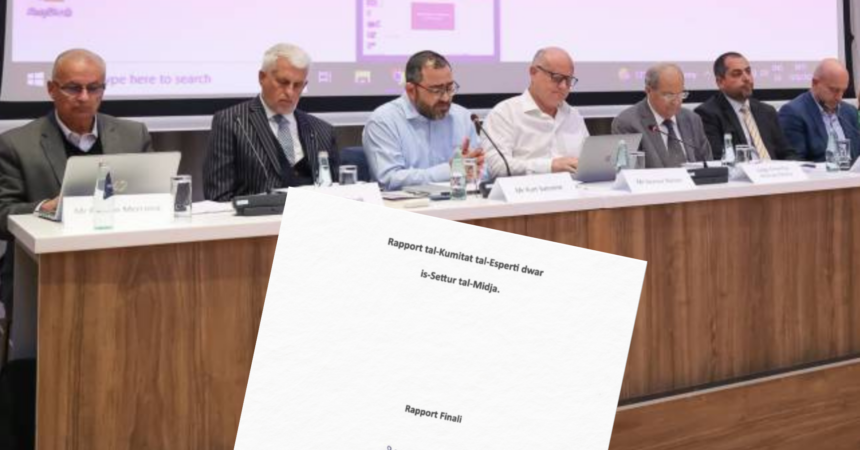Recommendations in a report by a government-appointed media committee for upcoming legislation intended to improve journalists’ safety and the local media sector do not stack up to proposals made for the same purpose by the public inquiry into the assassination of Daphne Caruana Galizia.
The report, which was tabled in parliament on Monday, remained hidden for three months since its completion last July as Prime Minister Robert Abela refused to publish it while parliament was in recess.
Analysis by The Shift shows that key recommendations for improvements to the journalistic sector by the inquiry, concluded in 2019, have not been fully addressed by the media committee’s report.
Of the public inquiry’s 28 key recommendations, 14 relate specifically to improvements toward the journalistic sector with rest addressing rule of law shortcomings which abetted Caruana Galizia’s assassination.
The media committee recommendations were made in response to ready-made proposed government legislation. While completely ignoring the inquiry’s recommendations relating to rule of law improvements, they also differ from the inquiry’s journalism-related recommendations.
The Daphne Caruana Galizia Foundation called attention to the blind eye turned toward the rule of law recommendations, calling the move a “confirmation of [Abela’s] government’s intention to ignore them” and a “worrying reminder that investigative journalists will remain unprotected,” in a press statement on Tuesday.
The government’s handling of the reform was also criticised by Council of Europe Commissioner for Human Rights, Dunja Mijatović, who sent a letter to Abela on Tuesday chastising the lack of significant results following Caruana Galizia’s assassination.
In her letter, the commissioner also noted repeated cases of denial of access to information by Abela’s government and urged for further amendments to the currently proposed legislation, particularly noting the “inadequate” law on strategic lawsuits on public participation (SLAPPS).
Rule of law recommendations ignored, journalism recommendations thinned out
Of the journalism-specific recommendations, the media committee’s latest report does not mention the inquiry’s recommendations for creating an independent Ombudsman or Commissioner for Journalistic Ethics.
The public inquiry also made recommendations for amendments to the Freedom of Information Act, which would limit instances where public administration may arbitrarily refuse to provide information in the public interest.
While the government media committee recommended for the Act to become inscribed in the constitution, it nevertheless said in its report it would “be subject to those conditions as provided for in the [current] ordinary law.”
The committee similarly did not echo the inquiry’s recommendation for a constitutional provision establishing the Broadcasting Authority as an independent entity but recommended another ad hoc committee to “analyse the current situation and propose reform”.
The recommendations made
While the report does not address all of the Caruana Galizia public inquiry recommendations, it includes a raft of changes and additions to the government’s proposed legislation.
Regarding strategic lawsuits against public participation (SLAPPs), the committee recommended a rephrasing of the law to include NGOs and activists under its protection.
Additionally, the committee recommended legislative amendments that would allow courts to order damages to be paid by the party initiating the court case to their target in SLAPP cases.
The committee also called for the protection of journalists, their sources, autonomy and the sector’s pluralism to be entrenched in the constitution.
Echoing the inquiry’s recommendations, the committee also called for the creation of a specialised committee overseeing the police’s protection of at-risk individuals and journalists. They recommended that the committee be chaired by the Home Affairs Ministry permanent secretary, with the police commissioner as a member.
Additionally, the committee called for a transparent system of State funding for media outlets and increased transparency in government advertising on media outlets.
A protracted process
Upon the report’s tabling in parliament on Monday, Prime Minister Abela acceded to pressure from journalists, editors, activists, and international press freedom organisations for the publication of a White Paper and public consultation ahead of furthering the legislative process.
The report, which remained unpublished for months, was the second prepared by the media committee, with its members having made €18,000 each since their appointment.
In April 2022, the Media Experts Committee, appointed by Abela the previous January, completed an initial report which prompted a backlash, leading Abela to halt the introduction of the media reform proposals until the committee could conduct further consultation and produce a second report.
Last October, The Shift published an analysis of the committee’s initial report and government proposals, finding it similarly fell short of the public inquiry recommendations.
The media experts Committee comprises IGM president and Assistant Editor at The Times of Malta, Matthew Xuereb, Media Today co-owner Saviour Balzan, Malta Today’s editor Kurt Sansone, The Malta Independent former senior editor Neil Camilleri, University Pro-Rector for Student & Staff Affairs Carmen Sammut, Criminology professor Saviour Formosa and chaired by Michael Mallia, a former judge who was one of three handling the public inquiry on the assassination of journalist Daphne Caruana Galizia.














In short another total waste of public funds.
Where the conclusions drawn are far short of what is professional, ethically and legally acceptable.
€18,000 each from OUR TAXES to serve Robert Abela dirty wishes. Red Carpet Whores.